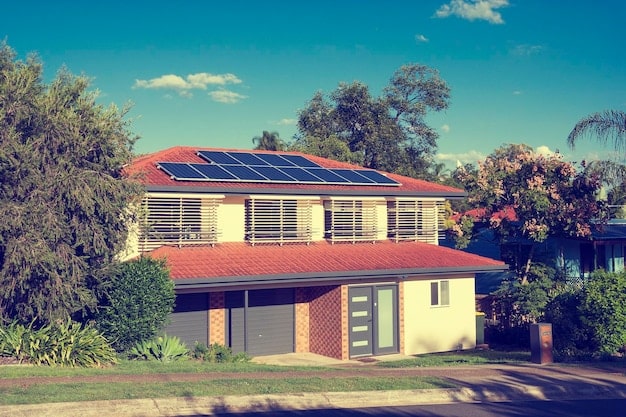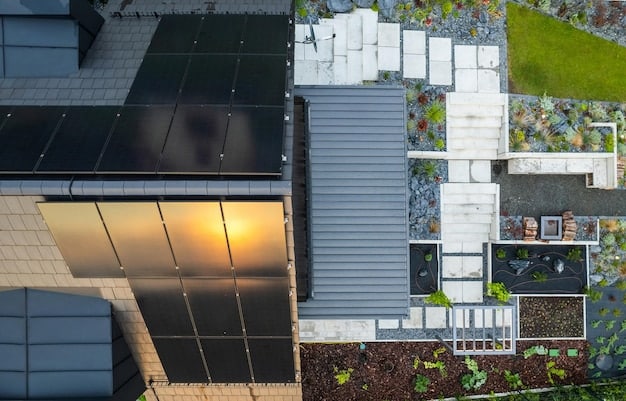What are the Latest Federal Incentives for Solar Panels on US Homes in 2025?

What are the Latest Federal Incentives for Installing Solar Panels on US Homes in 2025? They primarily involve tax credits under the Investment Tax Credit (ITC), potentially covering 30% of installation costs, with updates and eligibility criteria continuously evolving.
Considering solar panels for your home? Understanding the financial incentives available can significantly reduce the initial investment. What are the Latest Federal Incentives for Installing Solar Panels on US Homes in 2025? These incentives are designed to encourage renewable energy adoption, making solar power more accessible and affordable for homeowners across the United States.
Navigating these incentives requires staying informed about the latest policy updates and eligibility requirements. Let’s delve into what you can expect in 2025.
Exploring Federal Solar Panel Incentives for US Homes in 2025
Homeowners across the United States are increasingly turning to solar energy as a sustainable and cost-effective alternative to traditional electricity sources. As we look forward to 2025, it’s crucial to understand the federal incentives available to help offset the costs of installing solar panels. These incentives can make going solar a more financially viable option for many families.
The federal government has long supported renewable energy through various tax credits and programs. Understanding these incentives is essential for anyone considering investing in solar technology for their home.
The Investment Tax Credit (ITC)
The Investment Tax Credit (ITC) is one of the most significant federal incentives for solar panel installation. It allows homeowners to deduct a percentage of the cost of installing a solar energy system from their federal taxes.
This credit has been a cornerstone of federal solar policy for years, and its continuation or modification greatly impacts the economics of residential solar installations.
- Current ITC Rate: Currently, the ITC offers a 30% tax credit for solar panel systems.
- Eligibility: To qualify for the ITC, the solar panel system must be new and installed at the homeowner’s primary or secondary residence in the United States.
- Claiming the Credit: The ITC is claimed when filing federal income taxes using IRS Form 5695.
The Investment Tax Credit is a substantial benefit that can drastically reduce the upfront costs of installing solar panels, making it a key consideration for homeowners exploring renewable energy options.

Understanding Potential Changes to Solar Incentives in 2025
As we approach 2025, it’s important to consider potential changes to existing solar incentives. Government policies can evolve based on various factors, including budget considerations and shifts in energy priorities.
Staying informed about proposed legislation and policy discussions is crucial for understanding the future landscape of solar incentives.
Policy Updates
Keep an eye on legislative actions that could impact the ITC or other solar incentives. Proposed changes may affect the credit rate, eligibility criteria, or even the types of solar technologies that qualify.
Industry advocacy groups and renewable energy organizations often provide updates on policy developments and analysis of their potential impacts.
Economic Factors
Economic conditions can influence the level of government support for solar energy. During economic downturns, policymakers may prioritize incentives that stimulate job growth and investment in renewable energy sectors.
Conversely, periods of economic expansion could lead to adjustments in incentive levels as part of broader fiscal policy considerations.
Monitoring these potential changes will help homeowners make informed decisions about investing in solar panels and taking advantage of available incentives before they expire or are modified.
How to Determine Your Eligibility for 2025 Solar Incentives
Determining your eligibility for solar incentives in 2025 involves assessing several factors related to your home, income, and the specifics of the solar panel system you plan to install. Understanding these requirements is essential for claiming the incentives successfully.
It’s advisable to consult with a tax professional or financial advisor to ensure you meet all the necessary criteria and maximize your benefits.
Home Requirements
The location and type of your home can impact your eligibility for certain solar incentives. Some incentives may be specific to certain states or regions, while others may have requirements related to the age or energy efficiency of the home.
Additionally, homeowners associations (HOAs) may have restrictions on solar panel installations, so it’s important to review their guidelines before proceeding.
Income Limitations
Some solar incentives are income-based, meaning that your household income must fall within certain limits to qualify. These income restrictions are designed to target incentives to lower and middle-income families who may need the most financial assistance to install solar panels.
Income limits can vary depending on the specific incentive and the state in which you reside.
System Specifications
The technical specifications of your solar panel system, such as its size and efficiency, can also affect your eligibility for incentives. Some incentives may have requirements related to the system’s performance or the types of components used.
- System Size: The size of your solar panel system, measured in kilowatts (kW), may need to be within a certain range to qualify for incentives.
- Efficiency Standards: Solar panels must meet certain efficiency standards to be eligible for some incentives.
- Installation Requirements: The system must be installed by a qualified professional to meet safety and performance standards.
By carefully reviewing these factors and seeking professional advice, you can determine your eligibility for 2025 solar incentives and make informed decisions about your solar panel investment.

Maximizing the Benefits: Strategies for Effective Use of Solar Incentives
Effectively utilizing solar incentives requires strategic planning and a thorough understanding of the available programs. By maximizing your benefits, you can reduce the cost of installing solar panels and accelerate your return on investment.
Consider consulting with a solar energy professional to develop a personalized plan that optimizes your incentive opportunities.
Combining Incentives
Explore the possibility of combining federal incentives with state and local programs to maximize your overall savings. Many states offer their own tax credits, rebates, and grants for solar panel installations, which can be used in conjunction with the federal ITC.
Research the specific incentives available in your area and determine how they can be stacked to provide the greatest financial benefit.
Timing Your Installation
The timing of your solar panel installation can impact your eligibility for incentives. Some incentives may have deadlines or expiration dates, so it’s important to plan your project accordingly.
Additionally, seasonal variations in solar panel performance can affect the amount of electricity generated and the resulting financial benefits.
Professional Guidance
Navigating the complexities of solar incentives can be challenging, so consider seeking guidance from a qualified professional. Solar energy consultants can help you understand the available programs, assess your eligibility, and develop a strategy to maximize your savings.
These experts can also assist with the application process and ensure that you meet all the necessary requirements to claim the incentives successfully.
By implementing these strategies, you can effectively utilize solar incentives to make your solar panel investment more affordable and rewarding.
What are the Latest Federal Incentives for Installing Solar Panels on US Homes in 2025? Future Outlook
Looking ahead to 2025, the landscape of federal solar incentives is expected to evolve in response to changing energy policies and advancements in technology. Understanding these potential shifts is important for homeowners considering solar panel installations.
Policy makers may adjust the existing incentives to align with broader energy goals and budgetary priorities.
Renewable Energy Goals
Considerations regarding long-term national renewable energy goals and emissions targets strongly influence further solar incentives. Stronger climate commitments could increase federal support through expanded or new incentive strategies.
Governmental ambitions for a transition towards cleaner energy sources could significantly boost solar adoption among homeowners.
Technological Advancements
Technological progress within the solar industry helps improve panel efficiency and reduces production costs, potentially influencing adjustments to incentive amounts. As solar technology becomes more affordable, incentive levels may scale accordingly.
Innovation in battery storage solutions and smart grid technologies could also impact future incentives, encouraging comprehensive home energy systems.
Economic Impact
The economic benefits associated with solar deployment are a major factor. Growth within the solar sector generates jobs and stimulates financial activities, prompting continuous support by various initiatives.
Increased market competitiveness and decreased prices make investment less dependent on strong federal subsidies; however, these still play a key role in accelerating adoption rates across varying geographical locations and demographic populations.
Staying up-to-date with these potential shifts in governmental strategies or technological developments ensures homeowners fully capitalize on available incentives.
| Key Point | Brief Description |
|---|---|
| 💡 Investment Tax Credit (ITC) | Offers a 30% tax credit for new solar panel systems installed on US homes. |
| 💰 Eligibility Factors | Includes home requirements, income limitations, and system specifications. |
| 📈 Maximizing Benefits | Combine federal, state, and local incentives; time your installation strategically. |
| 🔄 Policy Updates | Stay informed about legislative changes impacting solar incentives. |
Frequently Asked Questions
The ITC allows homeowners to deduct 30% of the cost of installing a new solar energy system from their federal taxes, significantly reducing the initial investment.
Yes, some solar incentives are income-based and designed to assist lower and middle-income households. Income limits vary by incentive and state.
To claim the federal tax credit, you must file IRS Form 5695 with your federal income taxes. Ensure your system meets all eligibility requirements.
Yes, combining incentives is often possible and can maximize your overall savings. Research available programs in your state and locality for details.
Future incentives may evolve based on governmental aims, advancing technology, together with positive economic effects of this growing and job-creating solar industry.
Conclusion
Understanding what are the Latest Federal Incentives for Installing Solar Panels on US Homes in 2025? is crucial for homeowners considering renewable energy. The Investment Tax Credit (ITC) and potential policy adjustments can significantly impact the financial viability of solar panel installations.
By staying informed and seeking professional guidance, you can maximize your benefits and contribute to a more sustainable future, making solar energy an accessible and affordable option for your home.